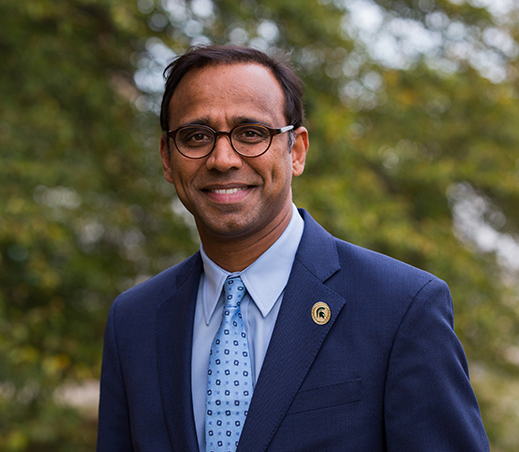Prabu David is dean of the College of Communication Arts and Sciences. This faculty voice is repurposed from his “Dean's Notes” series on the College of Communication Arts and Sciences website.
Cicero wrote that gratitude is "not only the greatest of virtues, but also the parent of the others." Though Cicero may have overstated his case a bit, there is mounting evidence that gratitude may be a super virtue. In other words, gratitude may be a superpower that spawns other virtues, positive habits of mind and everyday behaviors.
Simple gratitude practices, such as maintaining a gratitude journal, can increase happiness and well-being and improve our relationships. Inspired by this research, a few years ago I encouraged our community to collectively practice gratitude during the holiday season. We provided thank you cards that many in our ComArtSci community used to express gratitude. It was a fun exercise, and I heard about the creative ways gratitude was expressed. The experiences shared from the gratitude practice were truly uplifting.
Gratitude is more than just an emotion. It shapes our thinking and our actions and is an amalgam of past, present and future components. From the experiences shared with me from our gratitude practice, a common theme was “counting our blessings.” Our community members wrote about how fortunate or blessed they felt, which in turn inspired them to share their joy with others.
It is the sharing of joy with others, the forward-looking behavioral component, that spurs us to action. I have been thinking about gratitude exercises that will make a difference in our community during this difficult time as a way to see some light during the second year of the pandemic.
The most meaningful and obvious gift of gratitude that we can offer is empathy. The pandemic has had a disproportionate effect on some members of our community, taking its toll on the vulnerable and less affluent. We must begin by showing sensitivity to those who have had a particularly difficult time during the pandemic.
Then, how about raising the intensity of our gratitude practice? A few years ago, when I encouraged our community to practice gratitude, our emphasis was on written expressions of gratitude to our colleagues, and the focus was on reaching out to many colleagues.
This year, as we emerge from social isolation, let's focus more on quality human connection. We can begin by choosing someone in our life for whom we are grateful. Then, we can meet with that colleague or friend for coffee, lunch or a walk, and present them with a hand-written card.
In the workplace, empathy, time and generosity of spirit are some of the best gifts of gratitude. If you have ideas of other gratitude practices or experiences, please share them with me.
As we prepare for Thanksgiving, I would like to express my gratitude to our ComArtSci community: faculty, staff, alumni and students. Thank you for your empathy and attention to the needs of each other.
